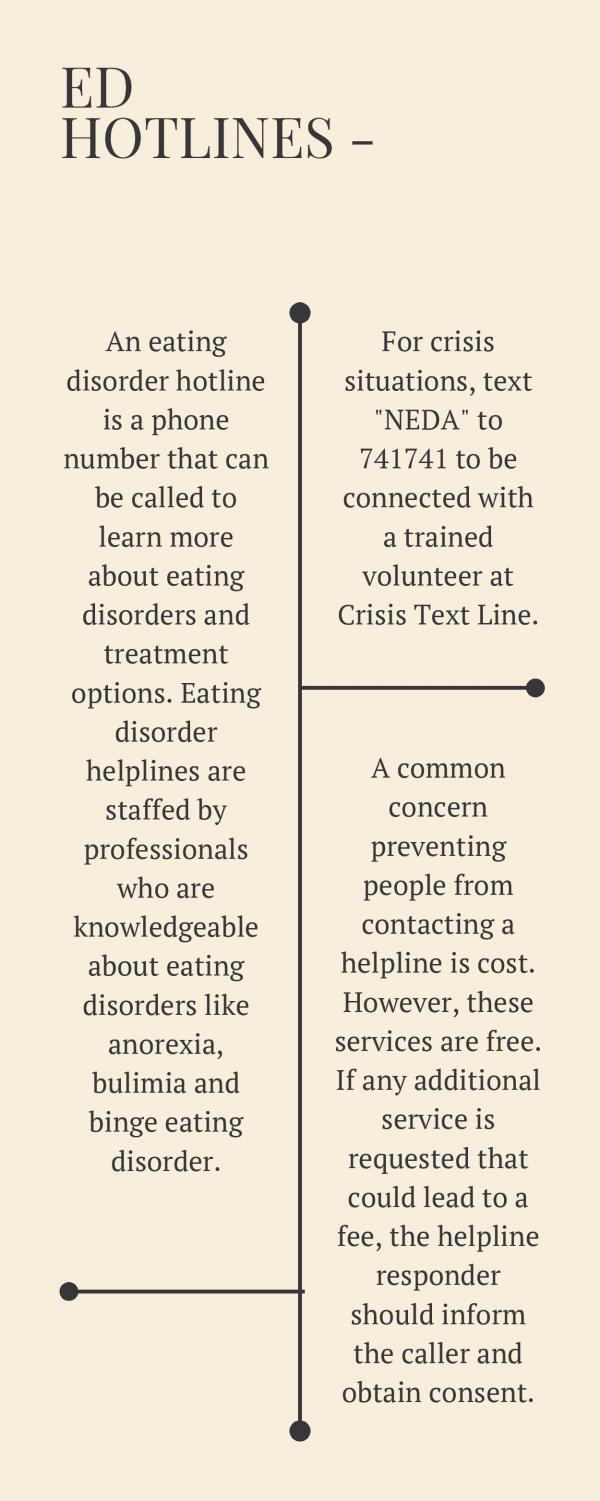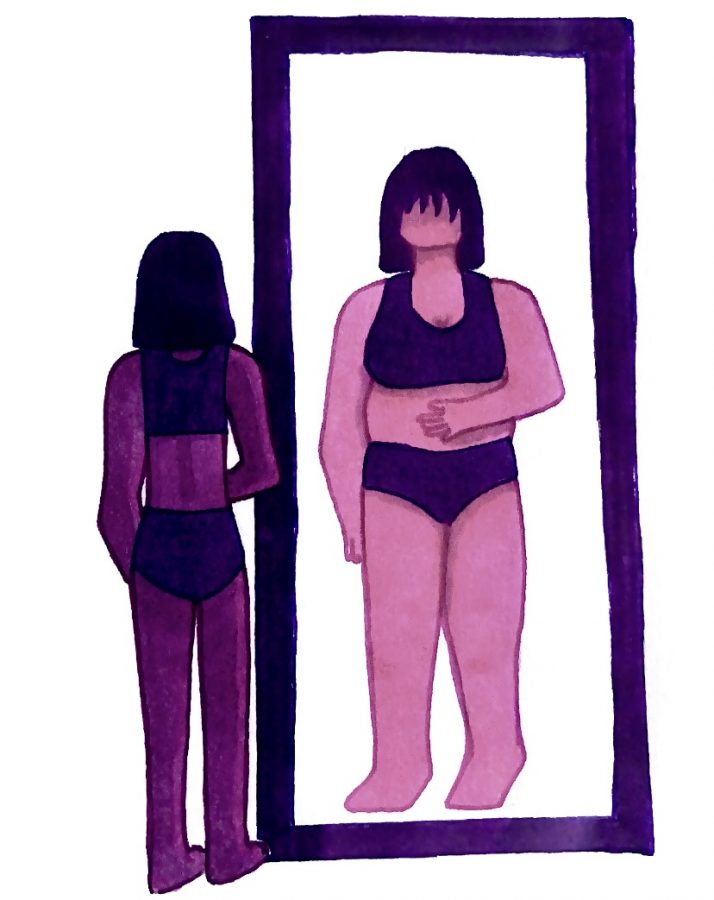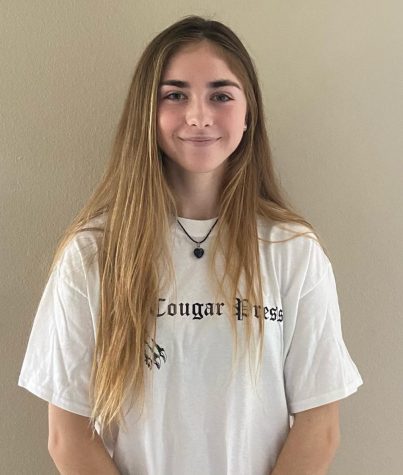Opinion: Volume I: The modern issue with beauty
“Body image includes both how you feel about your appearance and what you see when you look at yourself in the mirror. Often, this mental image can be quite different than reality, especially for those struggling with an eating disorder.” Information from: Anad.org
March 19, 2021
(Trigger Warning): A preview to the relations between social media, ED’s and self-esteem.
Being a teenager in today’s world is being overwhelmed with the media and being harmfully influenced due to the standards in which we set for ourselves. Self-esteem, specifically in teenagers, is viewed differently today than it was a decade ago. Beauty standards–regarding both men and women–have shaped our lives growing up, whether that be to lose or gain weight. The media today often portrays the thin waist and voluptuous curves of a woman, which is extremely idolized in today’s society. But what the media doesn’t recognize is the tens of thousands of young men and women who struggle to accept themselves over this same fit, those who can’t help but deprive themselves of food to try and fit into the standard.
Junior Martie Pecht voiced her thoughts, “I think beauty standards are completely unrealistic and absurd. Not every girl could be a size zero and no one should try. People are built differently and society has led people to believe that they need to be the same size and look the same way. This ideal really affects people, including me, and makes them believe that they are not good enough.” It’s a silent issue, a part of a global emergency that kills about 10.2 thousand people each year, about one death every 52 minutes, according to ANAD, the National Association of Anorexia Nervosa and Associated Disorders. That is 10.2 thousand lives that were ultimately taken because they were trying to fit into a societal construct or couldn’t accept not fitting into it.
According to recent studies, there is no direct association to what causes an eating disorder. Everyone is different, and what feels normal for some could trigger a series of trauma for the other, making it difficult for them to get through just another average day. According to the American Psychiatric Association, eating disorders are illnesses in which the people experience severe disturbances in their eating behaviors, related thoughts and emotions. The typical mental state that many have of “skinny is normal,” act as a butterfly effect for those who don’t think the same way, making it extremely difficult to live in a world where all body images are normal.
The media’s aid in this issue is indisputable and can be seen through various ads and platforms. Whether it be in commercials promoting dietary plans that claim to help you shave off X amount of weight in an unreasonable amount of time, or social media ads promoting items such as compression pants or waist trainer belts promising you a flat stomach or a cinched waist. They’re traps. Individually, these ads are short lived — nothing but a tap or scroll, but when these advertisements are constantly boosted on the media and shoved down consumers’ throats, the sales correlate. They take advantage of peoples’ desire to fit into society’s detrimental construct and use it for their own benefit, leaving your pockets empty and aspirations unfulfilled.

Social media can be considered to be the devil’s advocate for the standard. Two popular platforms, Instagram and TikTok, are well known for people posting photos and videos when they “look their best” you could say. “I can’t even tell you the amount of times I see influencers dressed up in designer clothes, wearing too much makeup and calling it the ‘natural’ look. There’s nothing natural in pursuing a fake reality,” said senior Jocelyn Lee. “It’s okay to feel yourself, but I don’t think it’s right to put on a facade saying that it’s natural. It blurs the line between beauty and phony.”
Advertisements for clothing, in particular swimwear, also play a role in the standard. There’s nothing inherently wrong with advertisement, but the issue here is the same body type being advertised in them. The same “perfect bodied” model. It brings up the core question: what is being advertised, the clothing or the model? When asked for her opinion, senior Haley Sabo said, “[The beauty standard] is really dictated by whatever fits the male gaze. Whatever men think is hot becomes the beauty standard. It happens with fashion, for example female-equivalent sports in the olympics have super provocative outfits and for what? It puts women in a box because of something men like to look at.” The idea of ‘perfection’ and the cookie cutter physique is a damaging construct.
We see eating disorders on the news, TV and on the other media, but what is sheltered is facing these issues in our own community. We never think that it could affect one of us, or even the ones we love most, but it’s a difficult realization that simply isn’t reality. Senior Mikayla Wagner shared her own story with an eating disorder, “It first stemmed from being anxious all of the time. If I ate something, I would feel as if I had to throw up. It got to the point where I realized I hadn’t eaten in about a week. One morning I went to stand up, felt weird, everything started to blur, passed out and went to the hospital. I was hooked up to multiple IV’s because the doctor told me I barely had any nutrition in my body. This happened again two weeks later.” Anxiety, in Wagner’s case, was rooted from body shaming, which also plays a huge role in the mindset of what beauty should look like. “I would wear short shorts or dresses that I liked, and would get pushed down for showing it off. It was often referred to as ‘too revealing’ and ‘asking for attention.’”
While it’s used for fun and creativity, makeup is also a tool for people to indulge in to help cover up acne, scars, blemishes, etc. The beauty standard for the face has always included clear skin, but why? We’re all teenagers going through hormones and the majority of teenagers experience acne to some degree, so why do we try to hide it? No one should feel pressure to cover up what’s natural and quite normal. “I told myself, ‘you know what Mikayla, this is what you look like so might as well embrace it.’ It took time for me to realize that no amount of makeup was going to change my facial structure, no matter how much I wanted it to,” said Wagner.









![Lindsay Guzik, new assistant principal said, "I am settling in [at VHS] pretty well. I know a lot of the students, so that makes it a little bit easier coming from Cabrillo, and it's been nice to see them all grown up." Photo by: Abraham Kassa](https://thecougarpress.org/wp-content/uploads/2025/09/IMG_9728-300x200.jpg)
